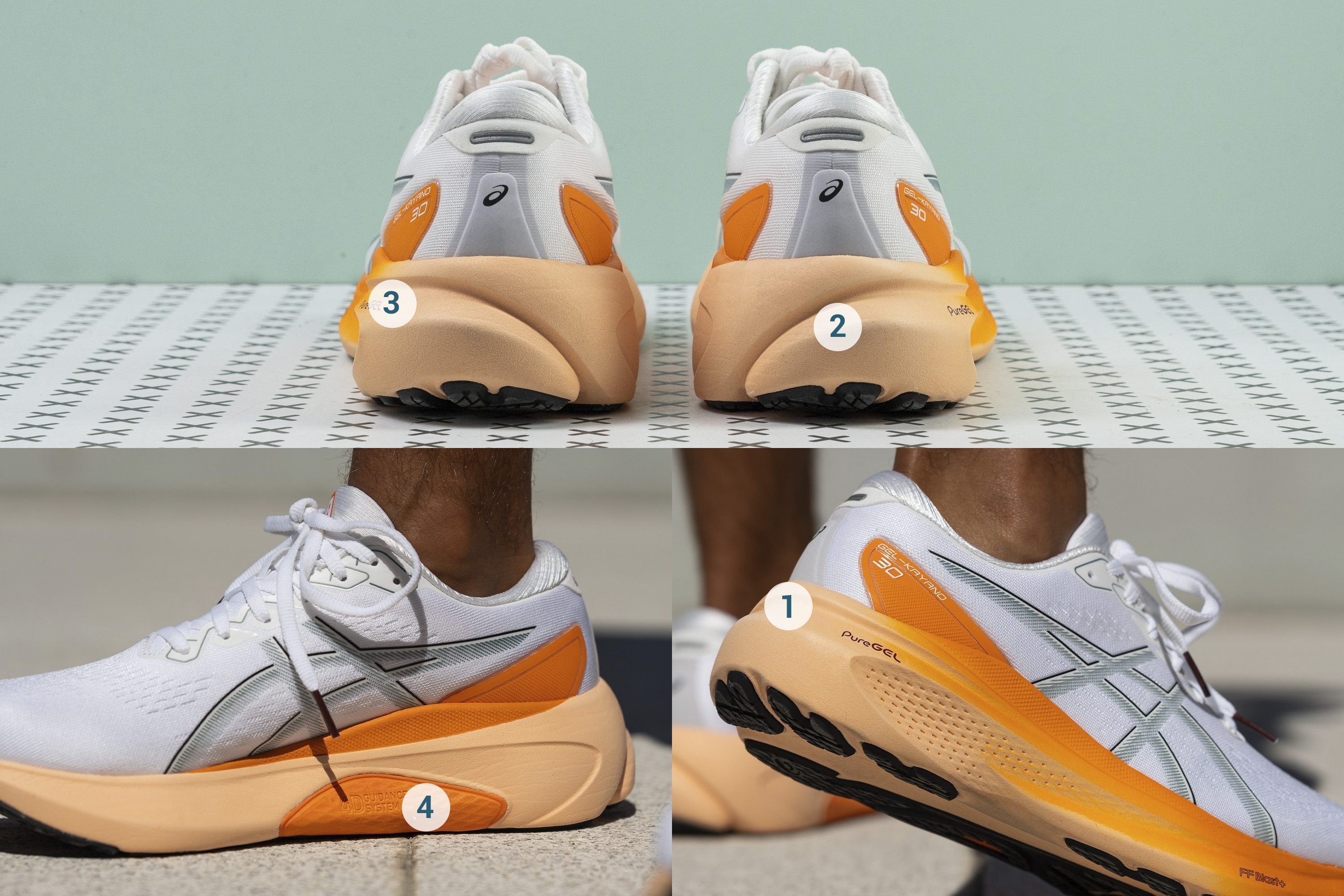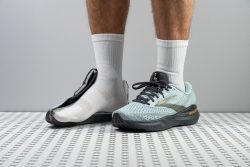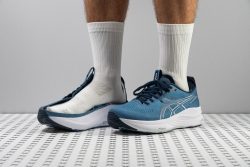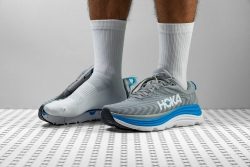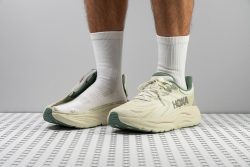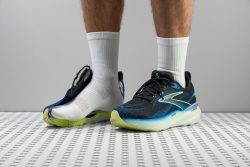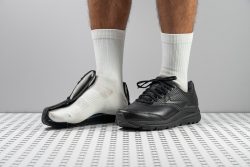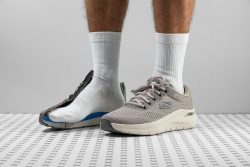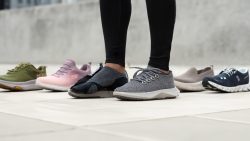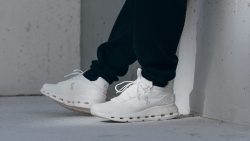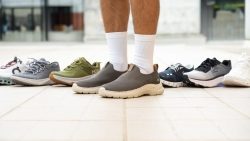7 Best Walking Shoes For Overpronation in 2025
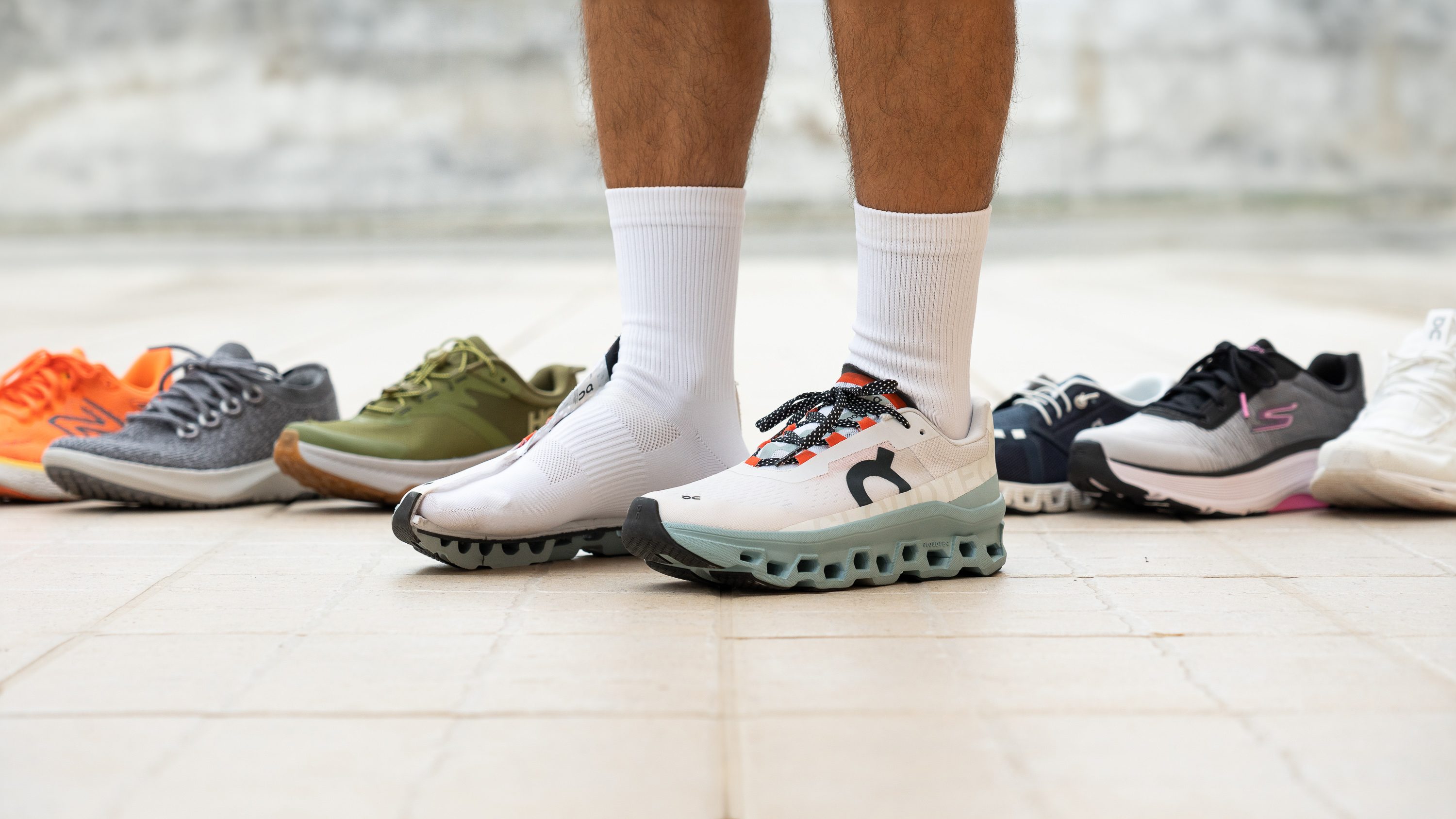
We buy shoes ourselves. We earn commissions when you buy through us, at no extra cost. Why trust us
Have you ever bought a pair of shoes that made your arches cry in a matter of a few steps at the park? If you have, or you simply don't want to experience such drama, then gear up with the best overpronation walking shoes.
We personally bought and tested the overpronation walking shoes you can see in this guide. This dual approach to shoe testing, where we wear the shoes ourselves and also test them in the lab, allowed us to select the best out of the best. Whether you need an all-around pair, an option that's cushier than most, or simply an affordable one, we have one that fits your priorities.
How we test walking shoes for overpronation
We want you to find the best walking shoe for overpronation for you. Here's how we do it:
- We purchase overpronation walking shoes with our own money.
- We wear-test these supportive kicks on various surfaces, including concrete and cobbled ones.
- To make our reviews even geekier, we test the shoes in the lab, where we use calipers, durometers, smoke machines, and other instruments that help us describe the shoe with over 20 data points. We also cut the shoes in half to be able to inspect every inch of them, be it a thread, a gel insert, a patch or a plate.
Best walking shoes for overpronation overall
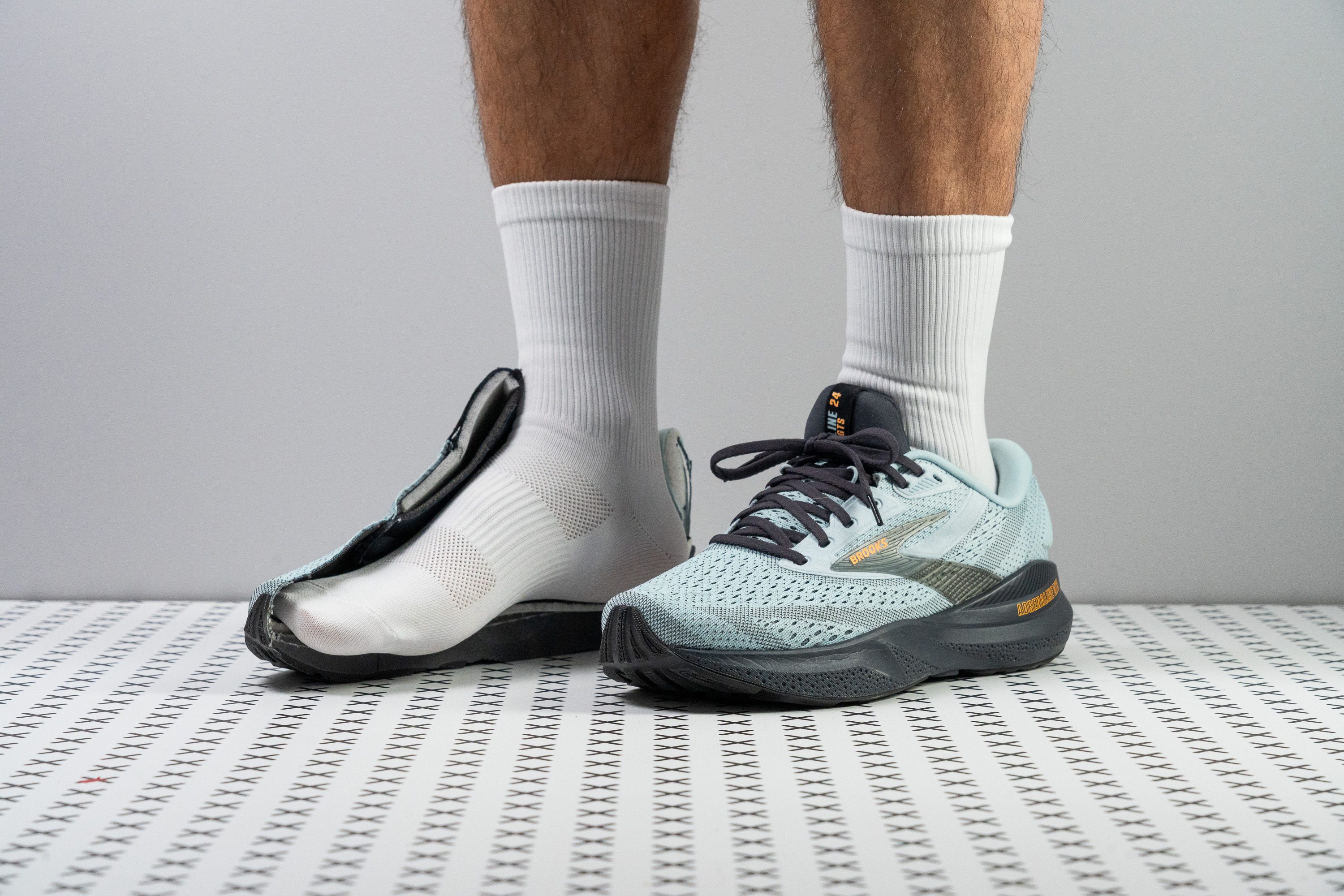
















































What makes it the best?
After deep-diving in the lab, we found that the Brooks Adrenaline GTS 24 is cleverly engineered by being stiff and forgiving in key areas. It offers unmatched stability through its GuideRails technology and reinforced arch support, without losing the fluidity needed for relaxed strolls. We’d choose it as the best overpronation walking shoe in a heartbeat.
The GuideRails technology extends on both sides of the shoe, connecting with the midsole sidewalls. It aims to keep us well-planted inside the shoe, and that’s exactly how we felt during wear tests. Excessive lateral movement would take much effort, proven by its 4/5 torsional rigidity score in our assessment.
The wide and stiff heel also contributes to stable steps. We measured it at a broad 95.0 mm, ensuring we have room to find our balance. Meanwhile, the heel counter, which rated 4/5 in stiffness, held us firmly in place.
To balance out all the rigidity, Adrenaline GTS 24 has high longitudinal flexibility. It emerged 32.7% more bendable than average in our flex test, explaining why the ride felt natural despite all the sturdy features.
However, note that the toebox has limited height, so we can’t recommend it to those with high-volume feet.
Pros
- Stack height upgrade!
- Reliable support
- Breathable mesh with oversized vents
- Price remains unchanged
- Available in 4 width options
- Good durability
- Plush tongue for top comfort
- Ideal for heel strikers
- Foam upgrade to DNA Loft v3
Cons
- Firmer-than-expected midsole
- High drop may feel too steep
- Toebox height is a bit low
- Non-gusseted tongue
Walking shoes for overpronation with the best durability
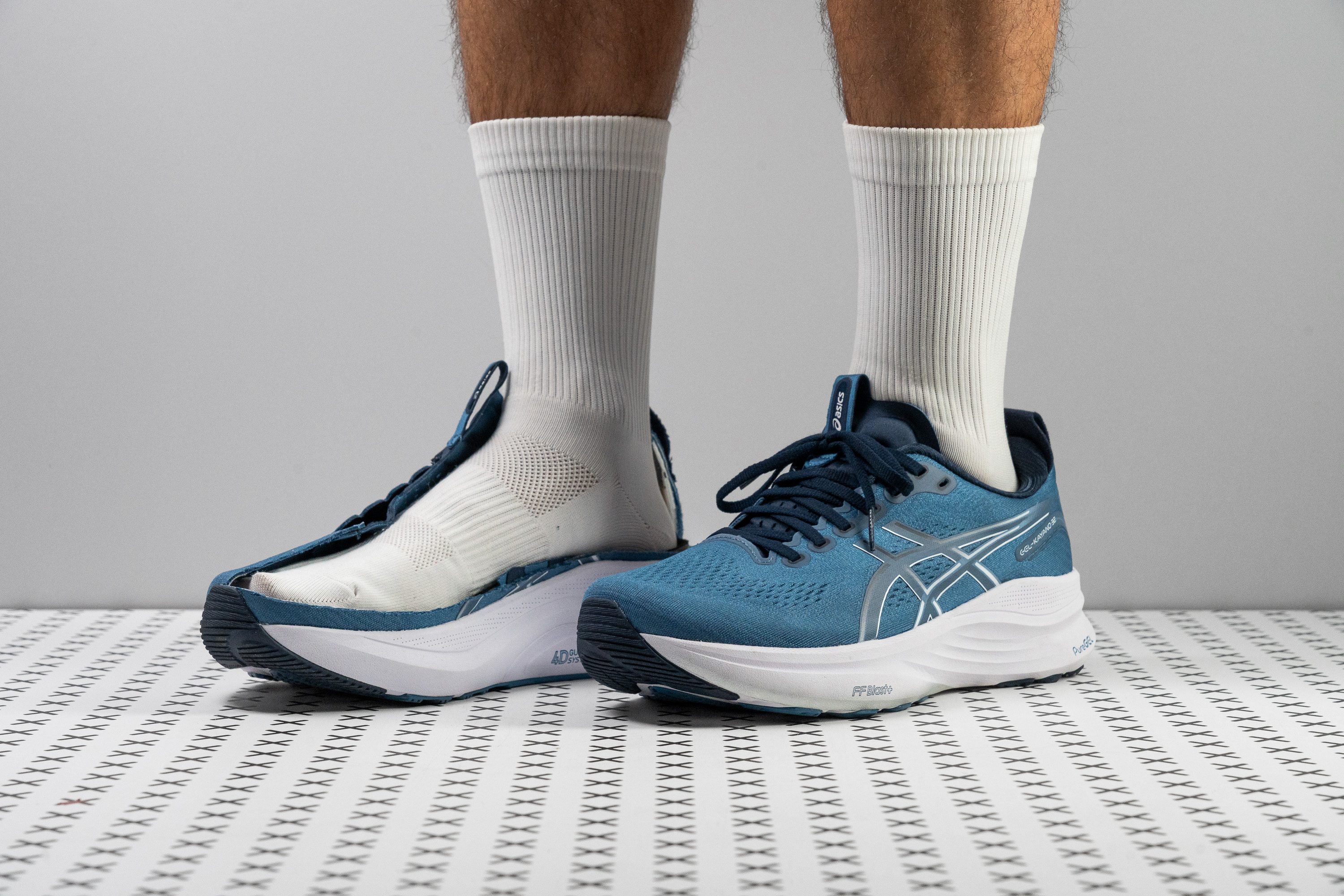













































What makes it the best?
Our walks with the ASICS Gel Kayano 32 deliver a completely worry-free experience, from its steady support, lasting comfort, and robust rubber that made us confidently log the miles. We barely saw any signs of wear after extensive testing, and our lab agrees it’s our best durable walking shoe for overpronation.
Getting the Hybrid ASICSGRIP outsole's precise measurements further cements its hard-wearing nature. In our Dremel test, it only had a minimal 0.7 mm dent, 30.0% less than average. Meanwhile, our caliper shows it has more than enough rubber for daily beating with its thick 4.5 mm rubber. For reference, the average is just 3.3 mm.
Because of the shoe’s revolutionary 4D Guidance System, it delivers stability without sacrificing cushioning. Another non-invasive support feature is the wide base, with 119.9/97.2 mm measurements that practically avoided any wobbles or spillovers, together with the twist-resistant midsole.
Comfort goes off the charts, notably with high shock absorption levels of 133 SA in the heel and 116 SA in the forefoot. As if that wasn’t enough, the heel is a massive 39.9 mm, which includes the PureGEL insert for even gentler pillowy landings.
This shoe felt like a dream, but those seeking a weightless ride may be disappointed in Gel Kayano 32’s bottom-heavy 10.4 oz (295g) figure.
Pros
- Amazing shock absorption
- Plush and breathable upper
- Made to last
- Dependable for most pronators
- Heavy-duty outsole with excellent grip
- Stable as a table
- Pillow-soft heel padding
- Improved fit
- Excellent build quality
Cons
- Not for soft-foam lovers
- Bad energy return
- Overpriced in Europe
Best walking shoes for overpronation and wide feet
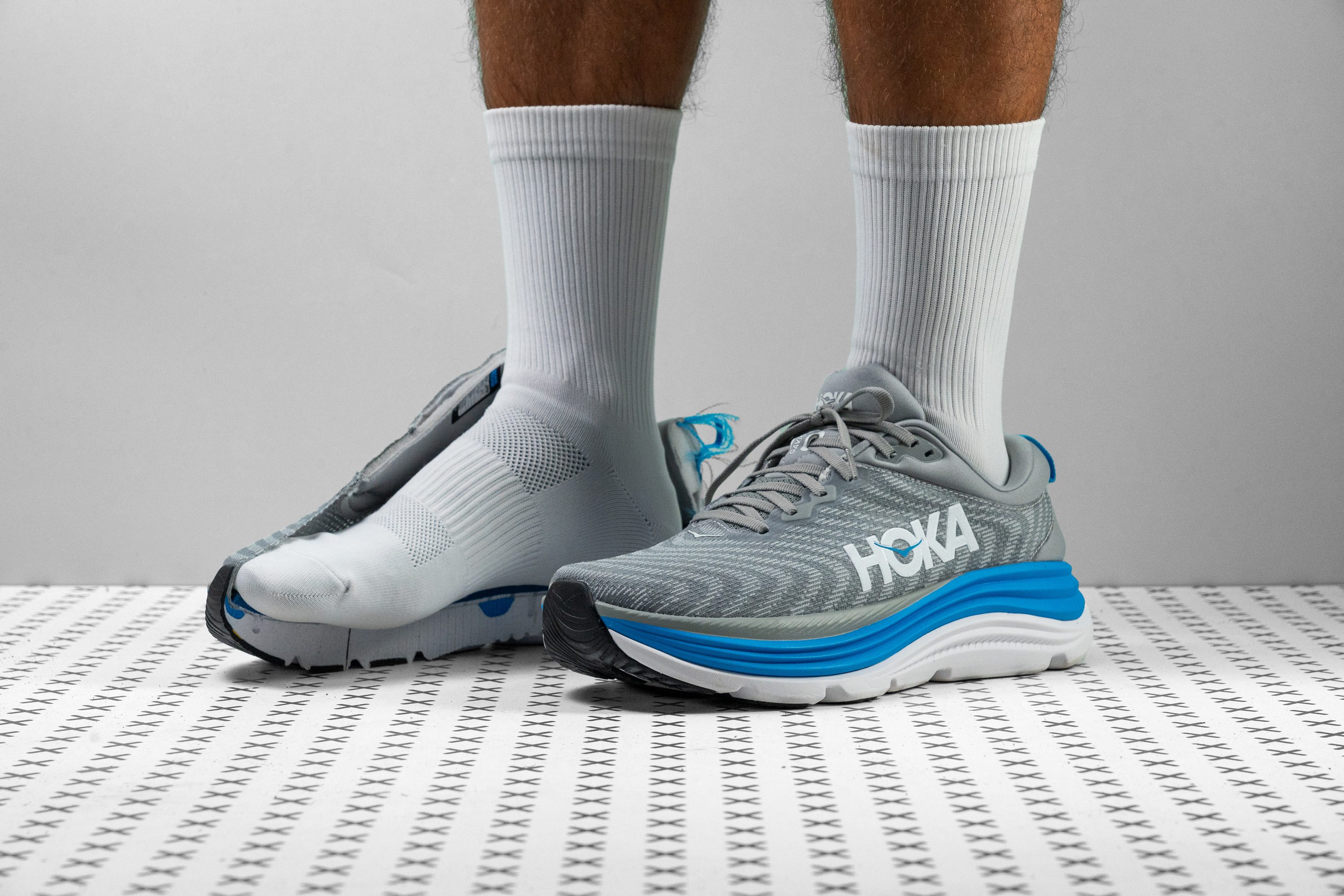

















































What makes it the best?
Countless miles on foot and hours in the lab made us confident to choose the Hoka Gaviota 5 as the best overpronation walking shoe for wide feet. Supreme comfort and undeniable support are the name of the game, delivered through its accommodating fit, sturdy H-Frame, and delightful cushioning.
It’s impossible to feel suffocated in a shoe as breezy and as wide as this. The toebox gave generous room for toe splay, at 101.8 mm in the widest part and 83.1 mm in the big toe area. The engineered mesh upper boosts its refreshing feel, confirmed by our breathability test with a perfect 5/5 rating.
Even the midsole itself is extremely spacious, verified by our caliper measurements of 125.1/106.6 mm. As one of the widest we’ve seen in the lab, those with broad feet can comfortably settle in. Besides the wide base, the sturdy H-Frame adds to our surefootedness since it mitigates excessive movements.
Underfoot, our arches loved the cushion’s plush feel. Our durometer confirms it’s 38.6% softer than average, muting out the ground impact. Additionally, we found a firmer 22.0 HA foam that’s meant to stabilize our form, avoiding the early onset of fatigue.
Gaviota 5 has so much to offer that its 10.6 oz (299g) weight reflects this. Those who prefer a more agile experience should opt for lighter pairs.
Pros
- Remarkably stable
- Breathable and comfortable upper
- Lightweight for its size
- Good stability option for forefoot strikers
- Ideal for wide feet
- Excellent for long runs
Cons
- Low drop might pose issues for heel strikers
- Performs poorly in colder conditions
- Not for narrow feet
- Midsole feels flat
Best lightweight walking shoes for overpronation
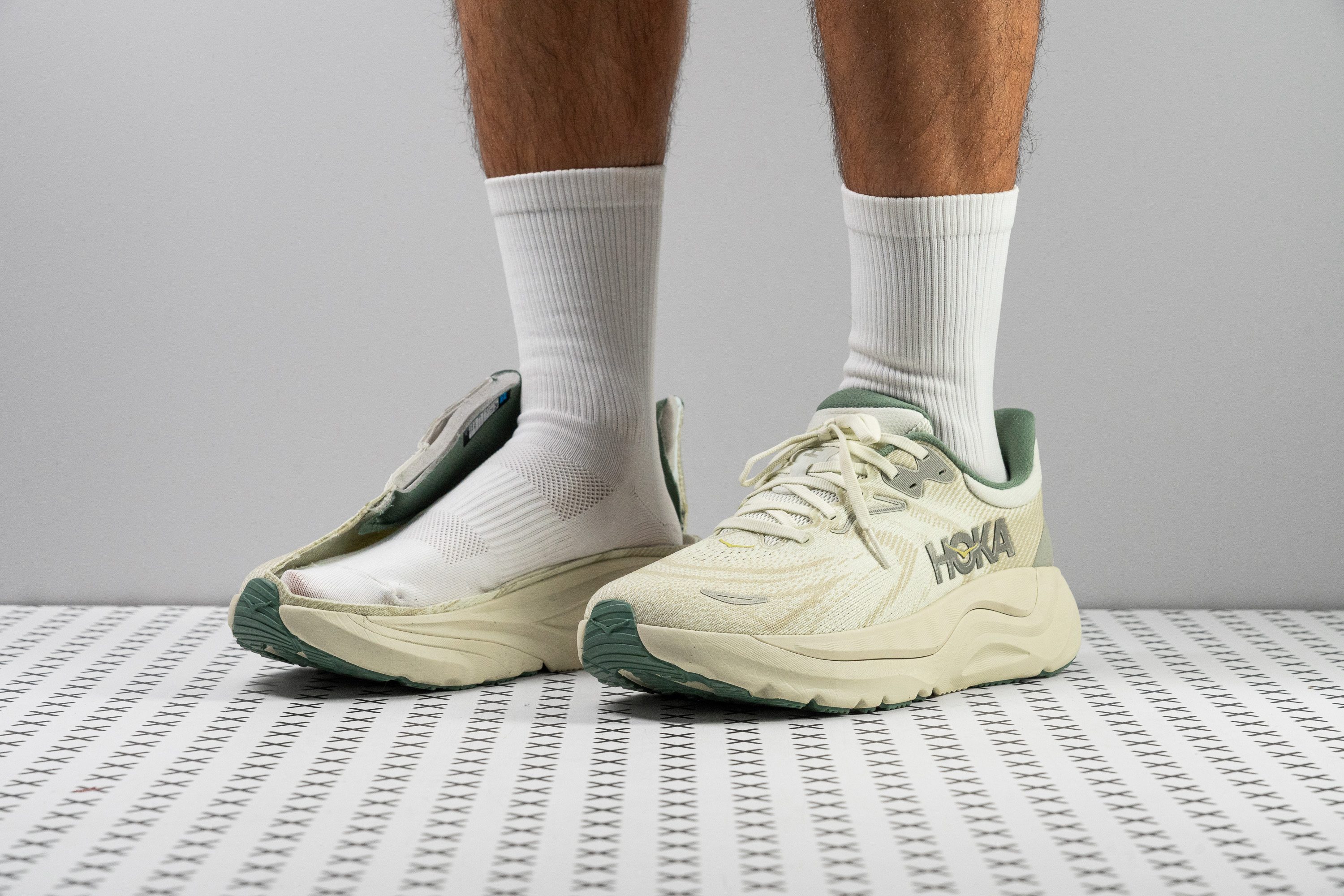











































What makes it the best?
Among the overpronation walking shoes we subjected to lab and wear tests, the Hoka Arahi 8 reigned in the lightweight category. We felt supported and fatigue-free because of the bolstering features and featherlike nature of this shoe. On top of that, it ensures comfort is not overlooked.
Setting the shoe on our scale, we logged a weight of 9.1 oz (259g), much lighter than the average 10.3 oz (293g) stability shoe. This manifested through unburdened strides during our walks.
We were surprised to see the shoe’s lightness given its size. Arahi 8 didn’t skimp on leg-saving cushioning and kept a high 39.4/28.1 mm stack to mute out ground feel. It relieved our muscles with next-level shock absorption, with a solid score of 138 SA in the heel, and offered 7.8% better impact protection than average.
The wide heel and H-Frame foam also fortified our balance during extended strolls. The H-Frame works its magic by effectively preventing excessive lateral motions. Its broad 96.3 mm heel also helps us find our footing with every step.
However, the natural feel is compromised by the reinforcing structure of the shoe. It takes 22.0% more force than the average walking shoe to bend to 30 degrees. If a relaxed and flowing experience is a must, we suggest skipping the Arahi 8.
Pros
- Impressively lightweight for its size
- Strong shock absorption
- Wider fit than previous versions
- Outstanding durability across upper and outsole
- Early-Stage Meta Rocker smooths transitions
- Higher drop suits better heel strikers
- Comfy and plush for everyday use
- H-Frame stability system
- Comfortable heel counter
Cons
- Very poor breathability
- Grip needs to improve
- Still no supercritical foam
- Minor price bump
Walking shoes for overpronation with the best shock absorption
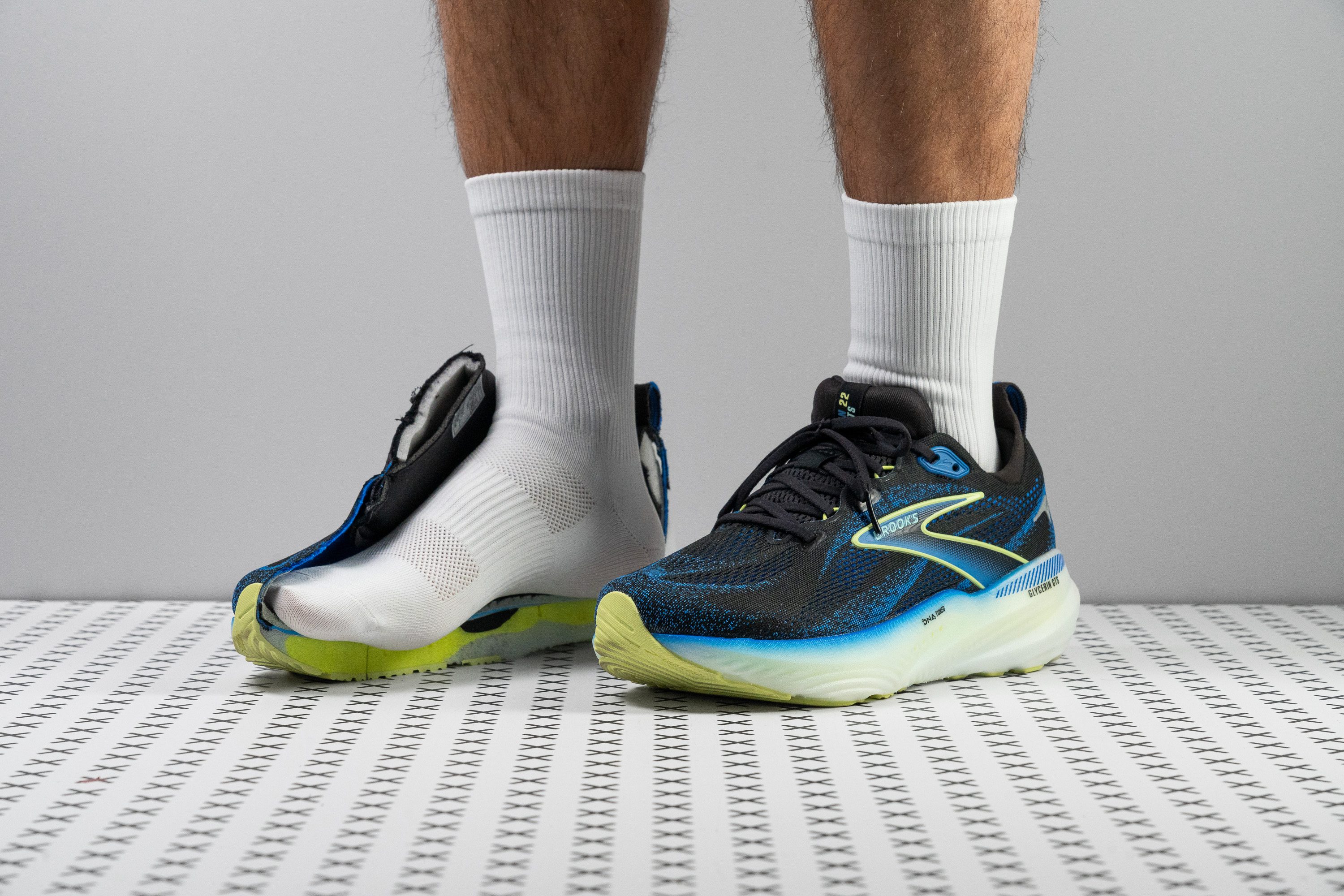
















































What makes it the best?
We experienced unmatched relief and reassured strides while walking with the Brooks Glycerin GTS 22. Our lab numbers show it breaks the norm by having a good balance of comforting and supporting our feet well, making it our overpronation walking shoe with the best shock absorption.
It’s unusual to see stability shoes with generous cushioning, yet that’s what we found in 37.8 mm heel. This significantly reduces impact and stress, especially since we land heel-first when walking. True enough, it validated its shock absorption with a high 122 SA score. To offset any imbalances, the already firm 24.1 HA midsole has an additional firmer 27.6 HA foam under the heel for safer landings.
The main foundation of support lies in the GuideRails system, incorporating higher midsole walls to enhance torsional rigidity. In our attempt to twist the midsole, we awarded it a high 4/5 rating. This innovative design not only provides extra support but also prevents excessive movements that can lead to injuries.
Providing us with a substantial area to find our footing is the spacious 97.1 mm heel. While this boosts surefootedness, the weight took the hit for the vast base and abundant cushioning. At 10.8 oz (305g), it’s 14.7% heavier than the standard. We suggest choosing other pairs if weightlessness is a top priority.
Pros
- Fantastic stability
- Impressively cushioned
- All-day comfort
- World-class outsole durability
- Superb lockdown with zero slippage
- Extra-breathable mesh
- Multiple width options
- New DNA Tuned midsole
- Does the job as a casual shoe
Cons
- Slightly heavy
- EVA-based foam lacks energy return
- Small price bump
Best leather walking shoes for overpronation
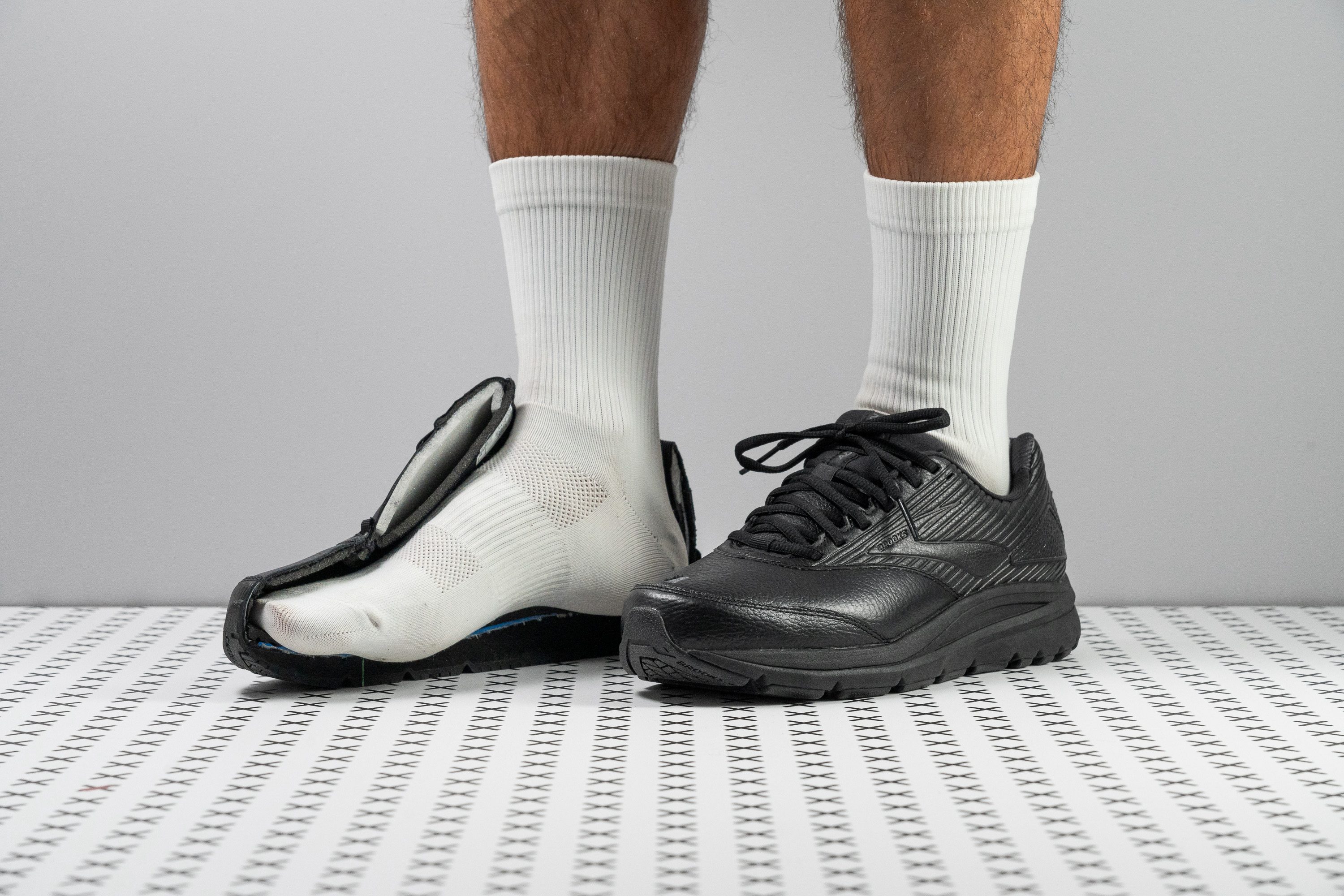



















































What makes it the best?
Brooks Addiction Walker 2 delivers unmatched stability and comfort for countless hours. The shoe’s unforgiving construction emphasizes support and durability, complemented by a balanced platform that promotes foot health. With a seal of approval from podiatrists and our lab, it’s our top leather walking shoe for overpronation.
The all-leather shoe is hard-wearing and our Dremel further establishes this fact when it barely left an impact on the upper. We awarded the toebox with the highest 5/5 score, which means it takes longer to break down than usual. From top to bottom, AW2 shows unbeatable durability with its substantial 5.5 mm outsole that’s 11.6% harder than average.
Underneath, the midsole shelters our arches from any pain. Our durometer shows the midsole is a balanced 25.9 HA, preventing the foam from compressing unevenly which leads to a very protective and stable ride.
The midfoot features an Extended Progressive Diagonal Bar, which while traditional is still very reliable in enhancing our footing and mitigating any excessive movements. The support feels spot-on and inspires confident strides. Additionally, we attempted to twist the shoe using our own strength and were unsuccessful—scoring 5/5 in stiffness. This centers us when our foot strike changes as we get tired.
Unfortunately, the sturdiness comes at the extra cost of weight. At 13.7 oz (388g), AW2 is 39.6% heavier than the average walking shoe.
Pros
- Unmatched stability and arch support
- Broadly recommended by podiatrists
- Incredible abrasion resistance and durability
- Thick and lasting cushioning
- Wide and steady platform
- Great for cold and drizzly days
- Comfortable in-shoe feel
- True to size and fit
- Can match formal work attire
Cons
- Heavier than average
- Quite stiff, needs breaking on
- Not as slip-resistant as claimed
- Not breathable
Best budget walking shoes for overpronation
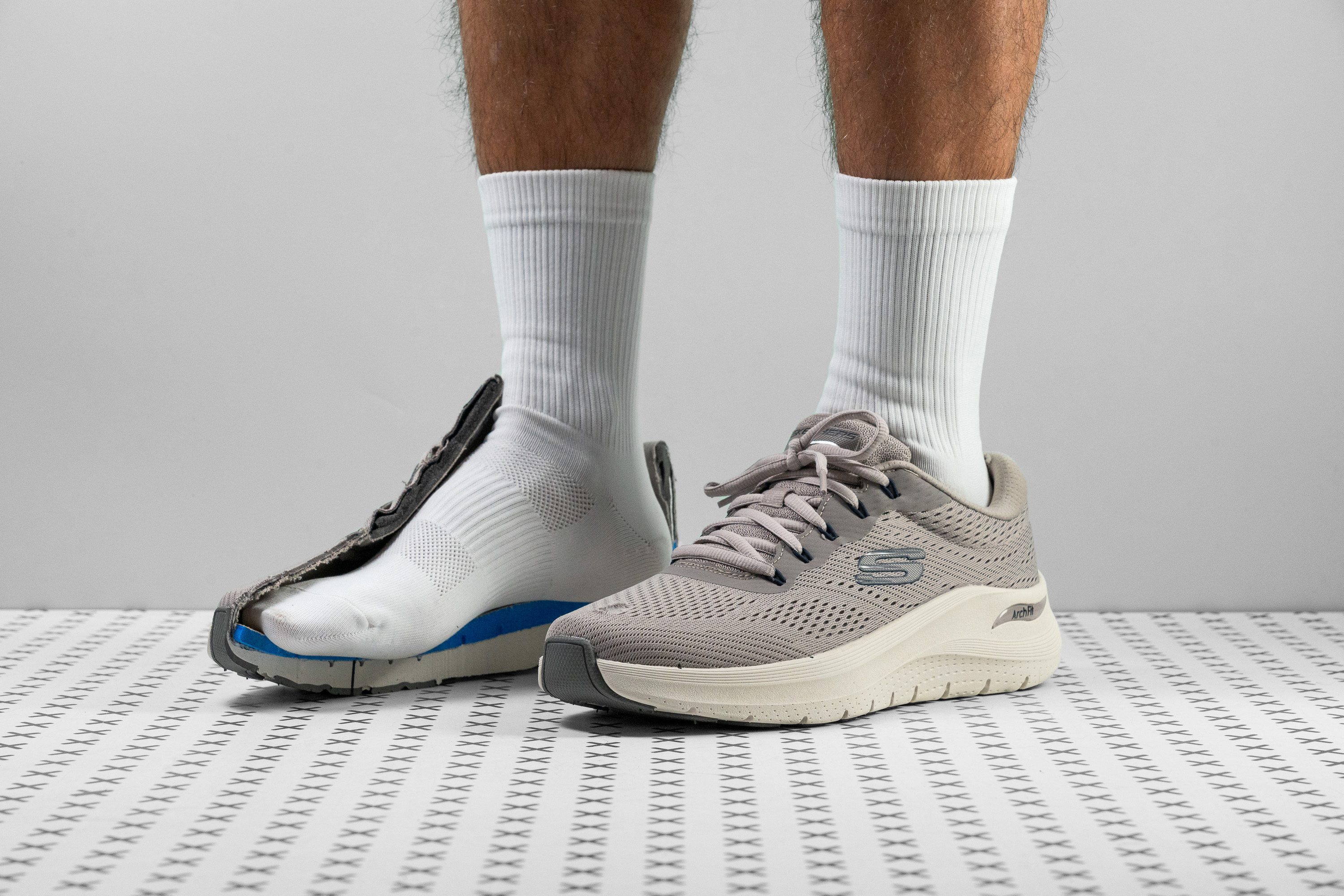














































What makes it the best?
Among overpronation walking shoes we put against lab and wear tests, Arch Fit 2.0 is our best budget pick. At an affordable $90, we believe its supportive and comfortable nature offers high value, especially for overpronators and those with foot conditions. For reference, walking shoes average $117.
This pair is all about stability, housing a wide and firm platform that ensures our surefootedness. Its 114.5/90.0 mm width provides more than enough room to land safely. We remain steady since the foam doesn’t collapse easily. Our durometer confirms a balanced 30.4 HA — the perfect mix for flat feet that need firmness for support and enough softness for relief.
We’re mindblown how the ride remains stable despite the skyscraper stack. The heel is the tallest walking shoe we’ve measured — a towering 39.2 mm. Paired with a taller-than-average forefoot, the 15.2 mm drop puts pressure off our ankles and Achilles. We stood for long hours comfortably.
Further cementing its dominance in stability, Arch Fit 2.0 adds some stiffness to the midsole for extra support. Our bend test confirms it’s 18.6% more resilient than average. Thankfully, it doesn’t feel too rigid because of the flex grooves throughout the platform.
We learned that Arch Fit won't last too long. It performed worse than average when put against the force of our Dremel in the upper, heel, and outsole.
Pros
- Amazing support for overpronation
- Tons of cushioning
- Wide and stable platform
- Lighter than the Arch Fit 1.0
- Perfect for all-day wear
- Padded and cozy interiors
- Great traction on wet and dry surfaces
- True to size
Cons
- Very poor breathability
- Lacks durability
Do you need walking shoes for overpronation?
Overpronation is an excessive inward rolling of the foot during the walking gait cycle. It is usually accompanied by fallen arches or flat feet, which collapse when the body puts too much pressure on the inner side of the foot.
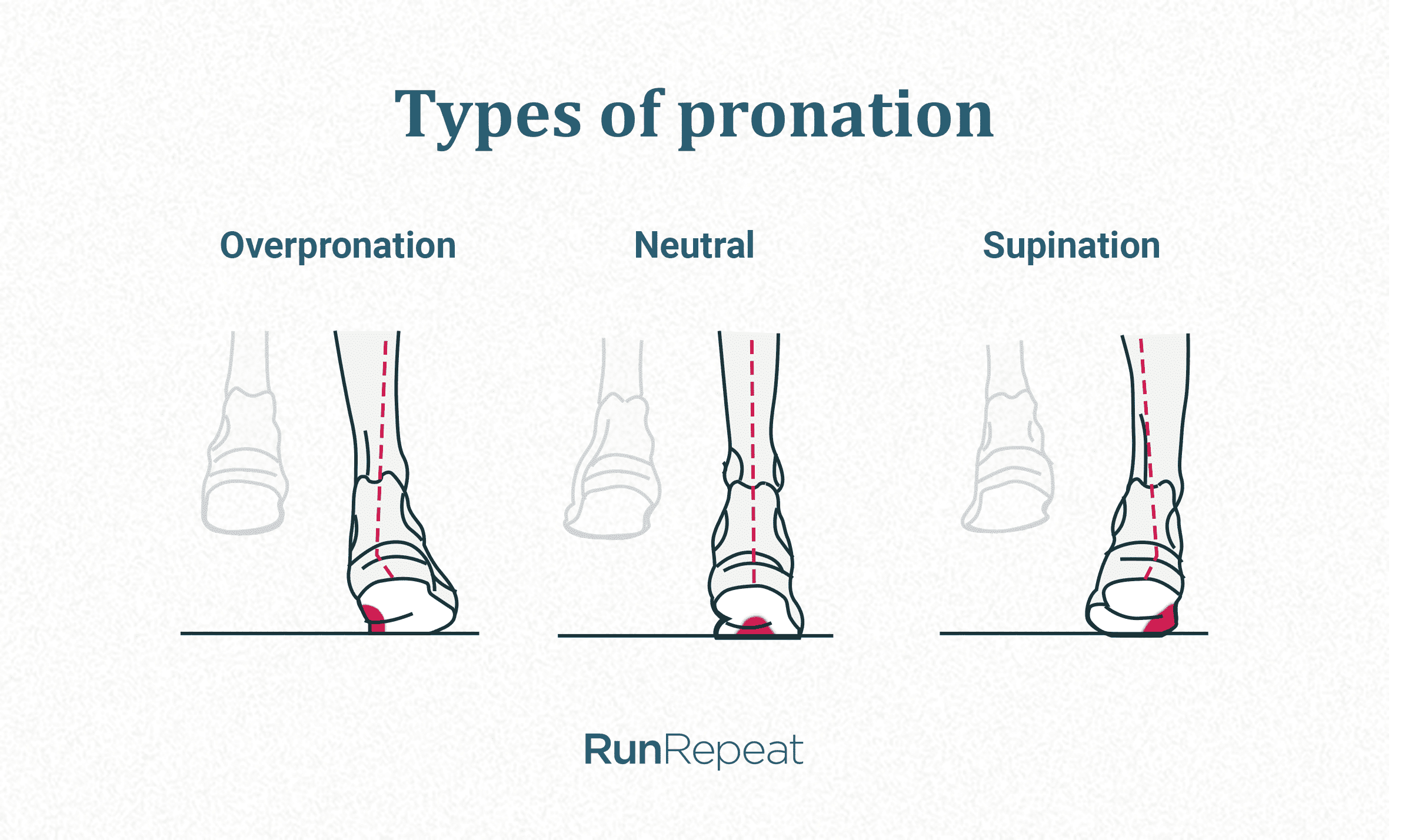
Because overpronation doesn’t always cause pain or discomfort, some people don’t even notice it! As this study showed, only half of the respondents were able to determine their foot type correctly.
In the less fortunate cases, however, overpronation can cause painful conditions like shin splints, plantar fasciitis, or even back pain, especially if you walk and stand for long hours on end.
If you want to be 100% sure, we highly recommend scheduling an appointment with a specialist (a podiatrist or an orthopedic doctor) who will determine your pronation type and the degree of overpronation (if any).
If you just want a quick DIY assessment, you try to do the following wet test at home:
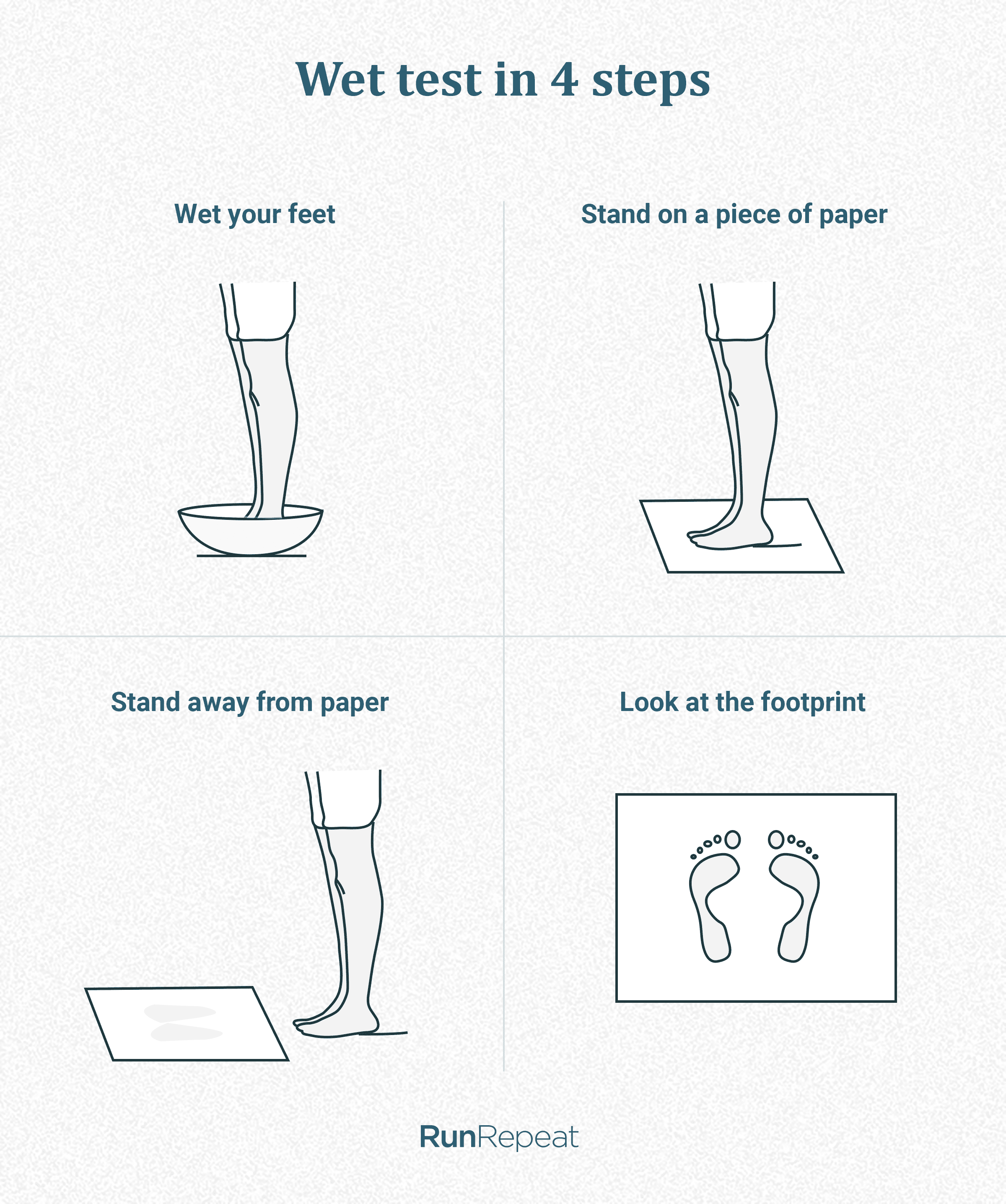
If your footprint has no cavity in the inner midfoot area (like in the first picture below), you are likely to have overpronation.
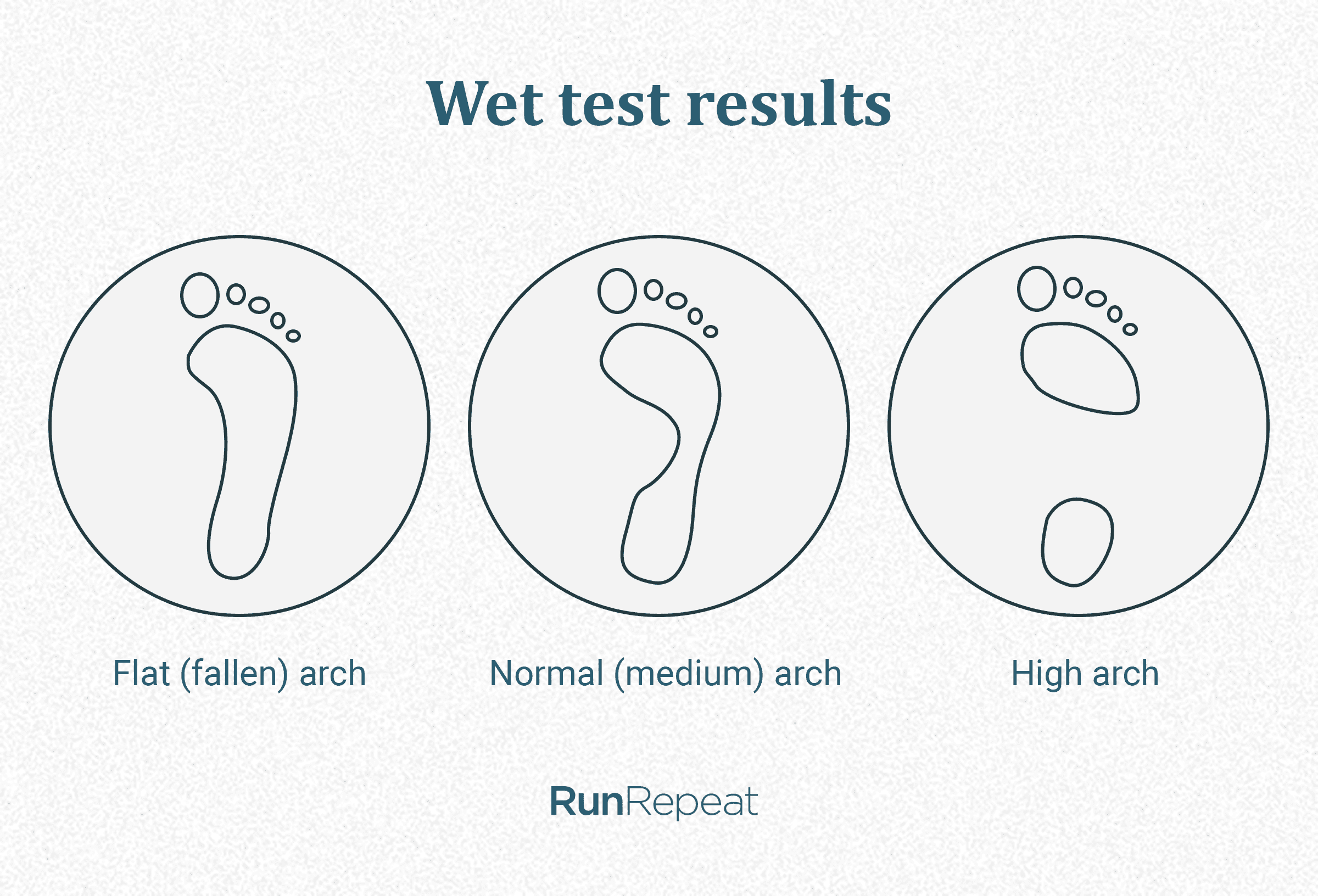
Another telltale sign of excessive pronation is the asymmetrical wear on your old shoes. If they get notably thinner on the inner side, losing rubber and foam and tilting your feet inwards, you need a more supportive walking shoe.
Because there are various degrees of overpronation, you may not always need the bulkiest stability shoe to compensate the condition. In mild cases, you can even get away with a regular (neutral) shoe as long as it’s wide and offers some inherent stability.
|
Overpronation degree |
Walking shoes to look for |
|
Mild |
Neutral (but inherently stable*) or Stability shoes |
|
Moderate |
|
|
Severe |
Stability shoes with more prominent support + prescribed orthotics (all walking shoes for overpronation come with removable insoles so you can swap easily) |
*A shoe can be described as inherently stable when it has a sufficiently wide platform, moderately soft or firm cushioning, or any other features that make it feel supportive (raised midsole walls or a midfoot cage on the upper).
What makes a walking shoe good for overpronation
All popular brands mark their overpronation shoes as “support” or “stability.” Brands like Brooks, Hoka, and ASICS even have several shoe lines that are targeted for overpronation and flat feet.
In our lab, we perform several tests to determine the stability of each walking shoe (be it neutral or supportive). That way, we can see the differences between stability shoes and also detect neutral shoes with good inherent support.
Here are the shoe features that cater to people with overpronation:
- high torsional rigidity
- stiff heel counter
- wide platform
Torsional rigidity
A torsionally stiff shoe will resist twisting at all costs. Its solid structure has no give in the midfoot and doesn’t allow the foot arch to collapse either. It makes the shoe feel laterally stable.
How is this achieved? Brands currently use two approaches to stability: dual-density midsoles and medial posts.
Dual-density midsoles feature two foams of different softness. The firmer one is placed in the areas where support is most needed - on the inner side of the midfoot (under the foot arch) and in the rearfoot (under the heel). In some shoes, you will find that firmer foam is placed under the soft foam - closer to the ground for stability.
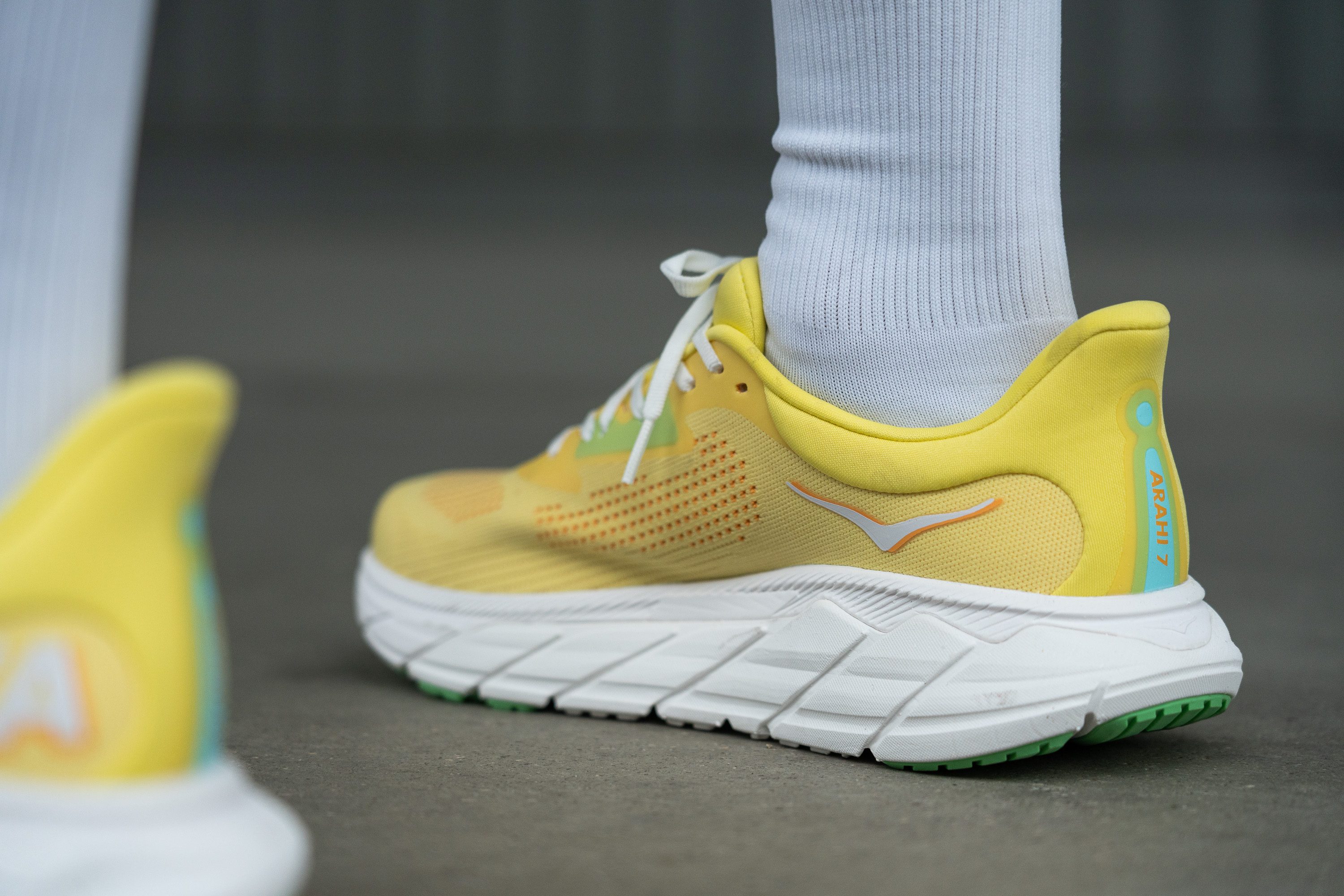
Medial posts are additional stabilizing components that are made of dense foam or plastic. They are placed in the midfoot (under the arch) to prevent it from collapsing.
However, in the past few years, medial posts have evolved significantly and don’t feel as intrusive as they used to. They work more like gentle guidance (or bowling alley bumpers in the case of Brooks) for the foot. These more recent stability technologies allow people with overpronation to enjoy the comfort of plush foams without losing stability.
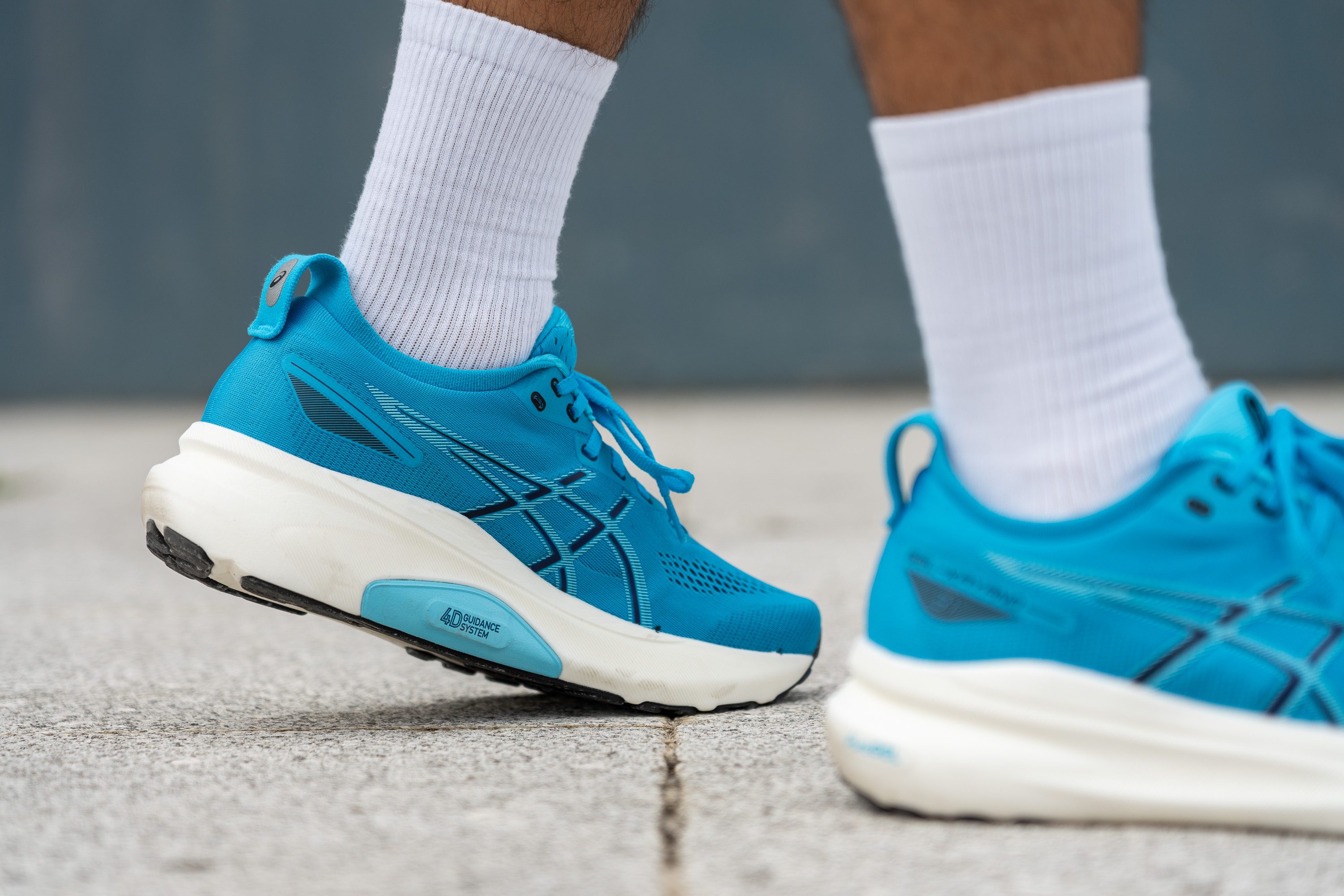
Both dual-density midsoles and medial posts are also accompanied by high midsole toplines which extend from the midfoot up forming a cradle for the foot.
No matter what stability tech is used, we assess each shoe’s torsional rigidity equally on a 1-5 scale. The greater its resistance to twisting, the higher the stiffness score (5 is the stiffest).
Stiff heel counter with a padded collar
All walking shoes for overpronation are built with stout heel counters to lock the wearer’s heel firmly in place. This helps to minimize in-shoe play and wobbling and prevents the foot from rolling early on in the gait cycle.
Some shoes have pretty aggressive external TPU heel counters for maximum support.
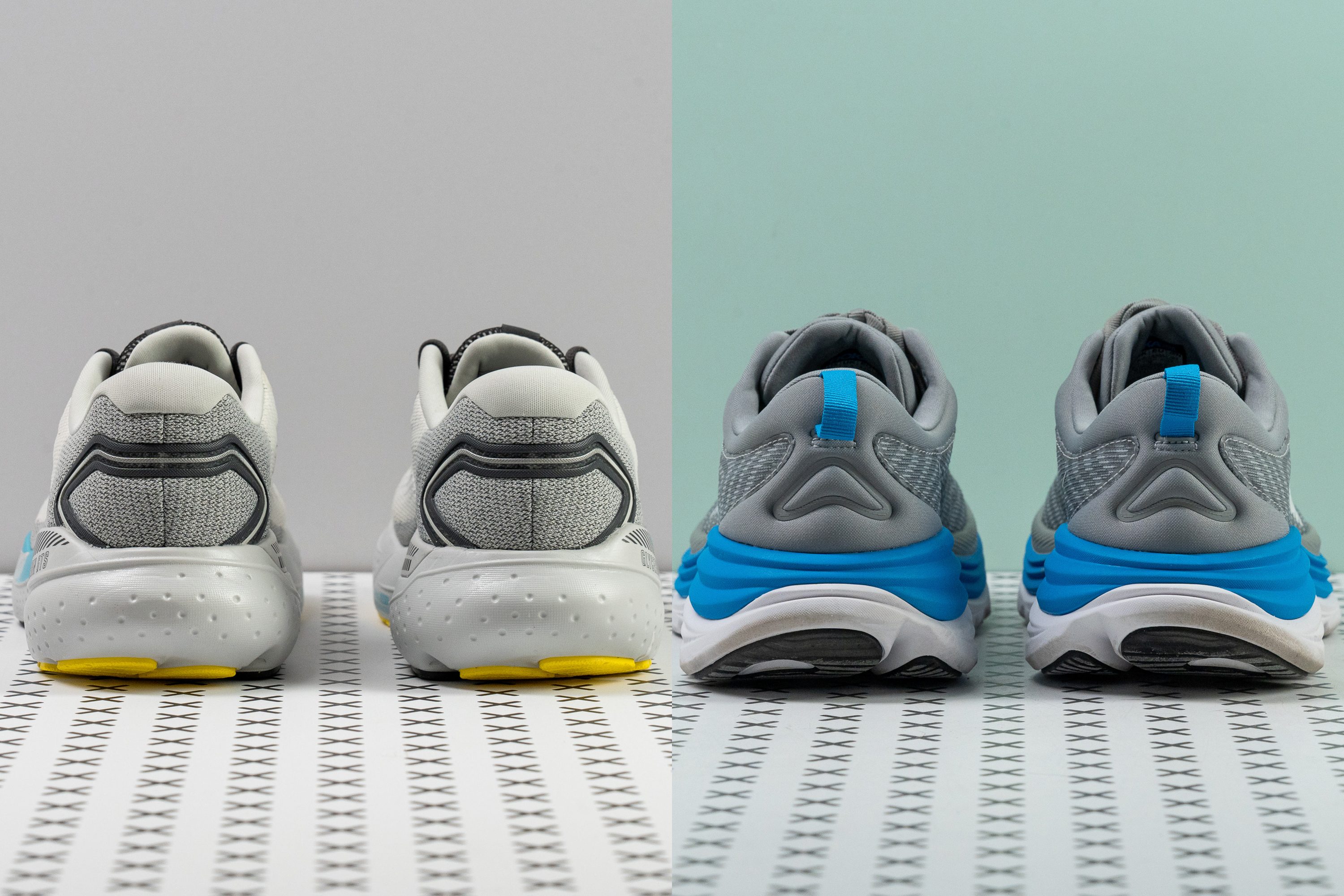
We also see considerably more padding in these shoes which also contributes to securing the heel and Achilles.
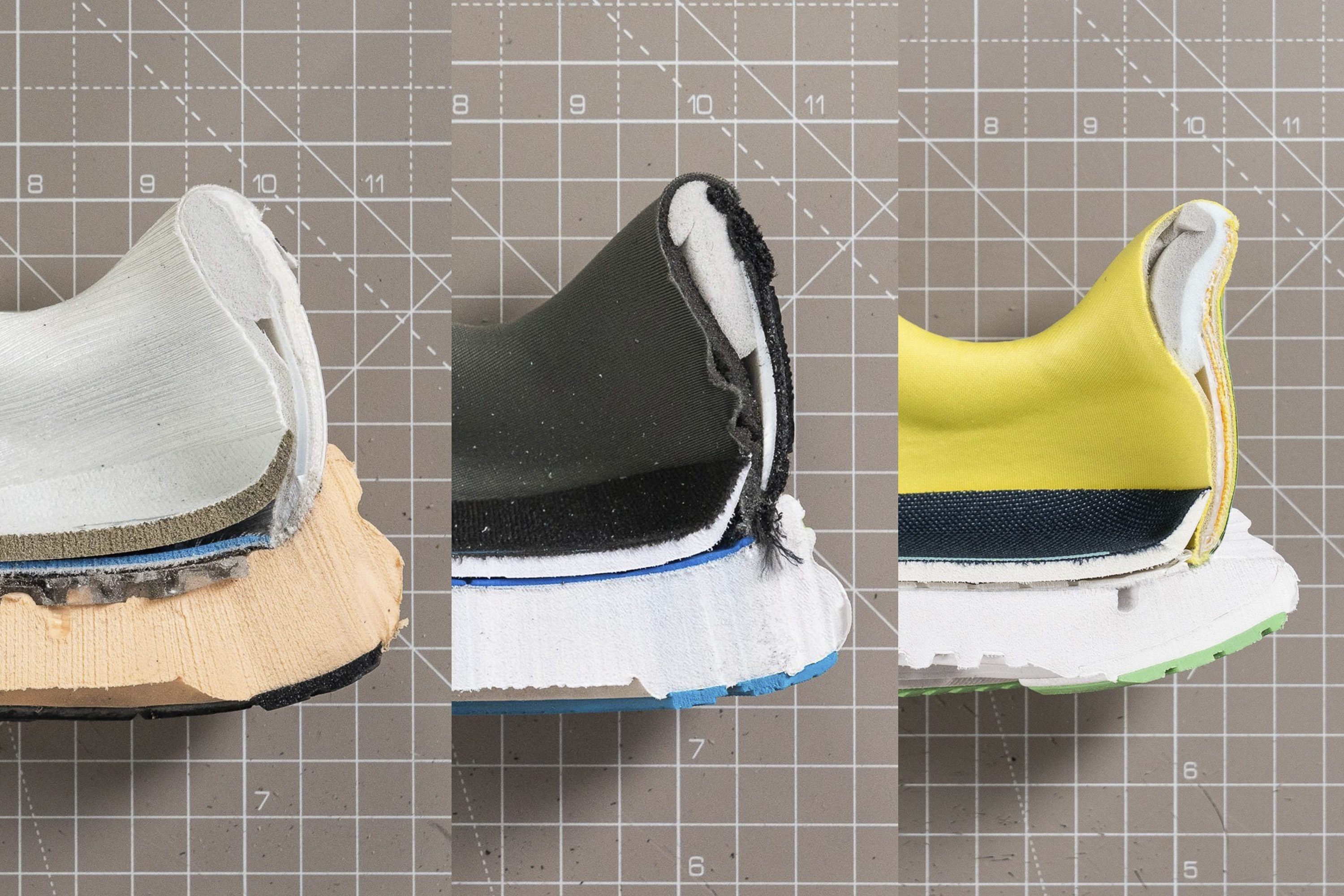
In our lab, we assess the stiffness of each shoe’s heel counter on a 1-5 scale. We squeeze it on the sides and push it from the back to assess resistance. The stiffest heel counters get the highest scores.
Wide platform
Even if the shoe lacks rigidity in the previous two areas, a wide platform can compensate the support. When the shoe’s midsole is broad enough from heel to toe, it won’t let your foot spill over the edge, even if the cushioning is soft.
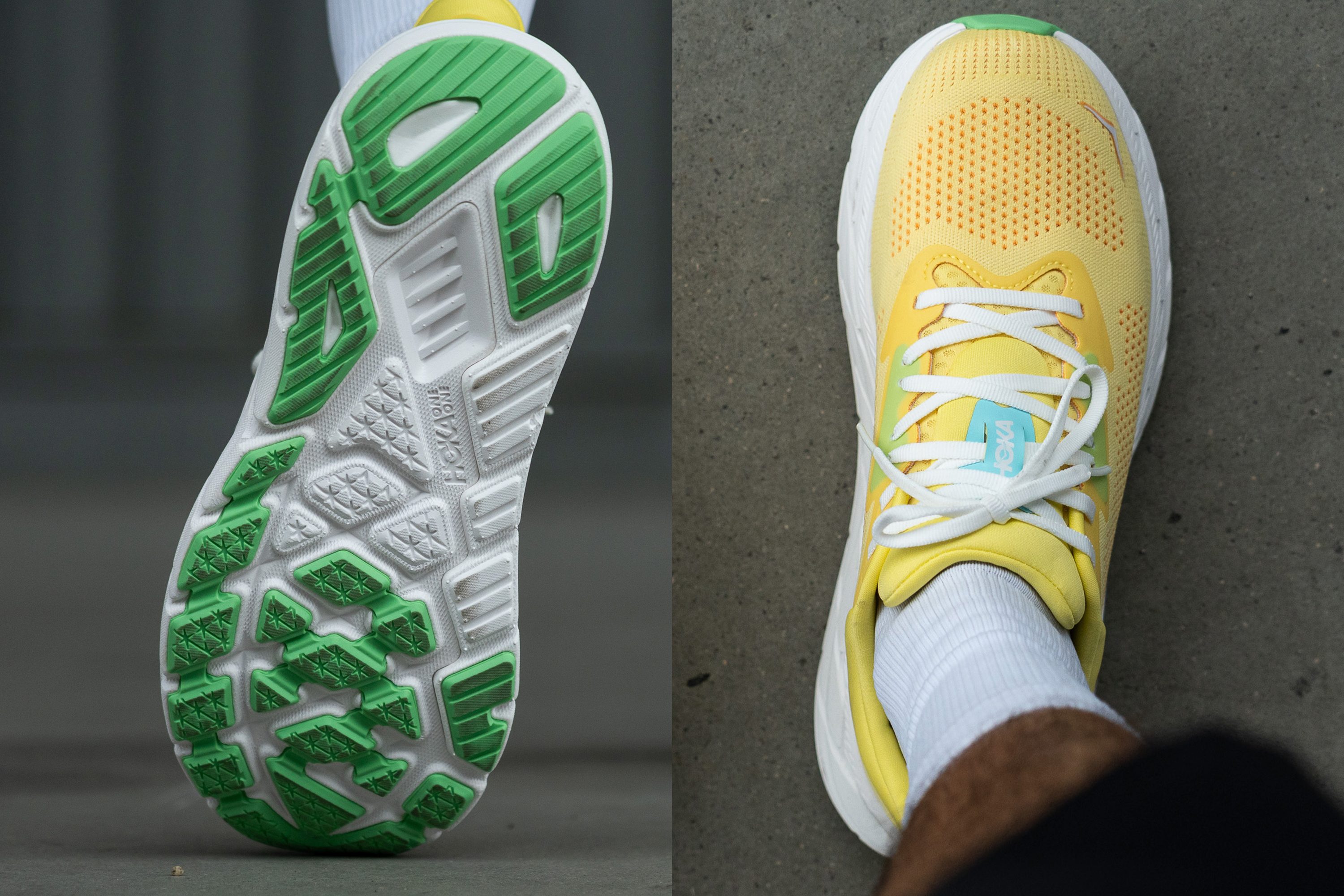
Equipped with a digital caliper, we meticulously measure the midsole width of every walking shoe. One measurement is taken in the widest part of the forefoot and the other one - on the widest area of the heel.
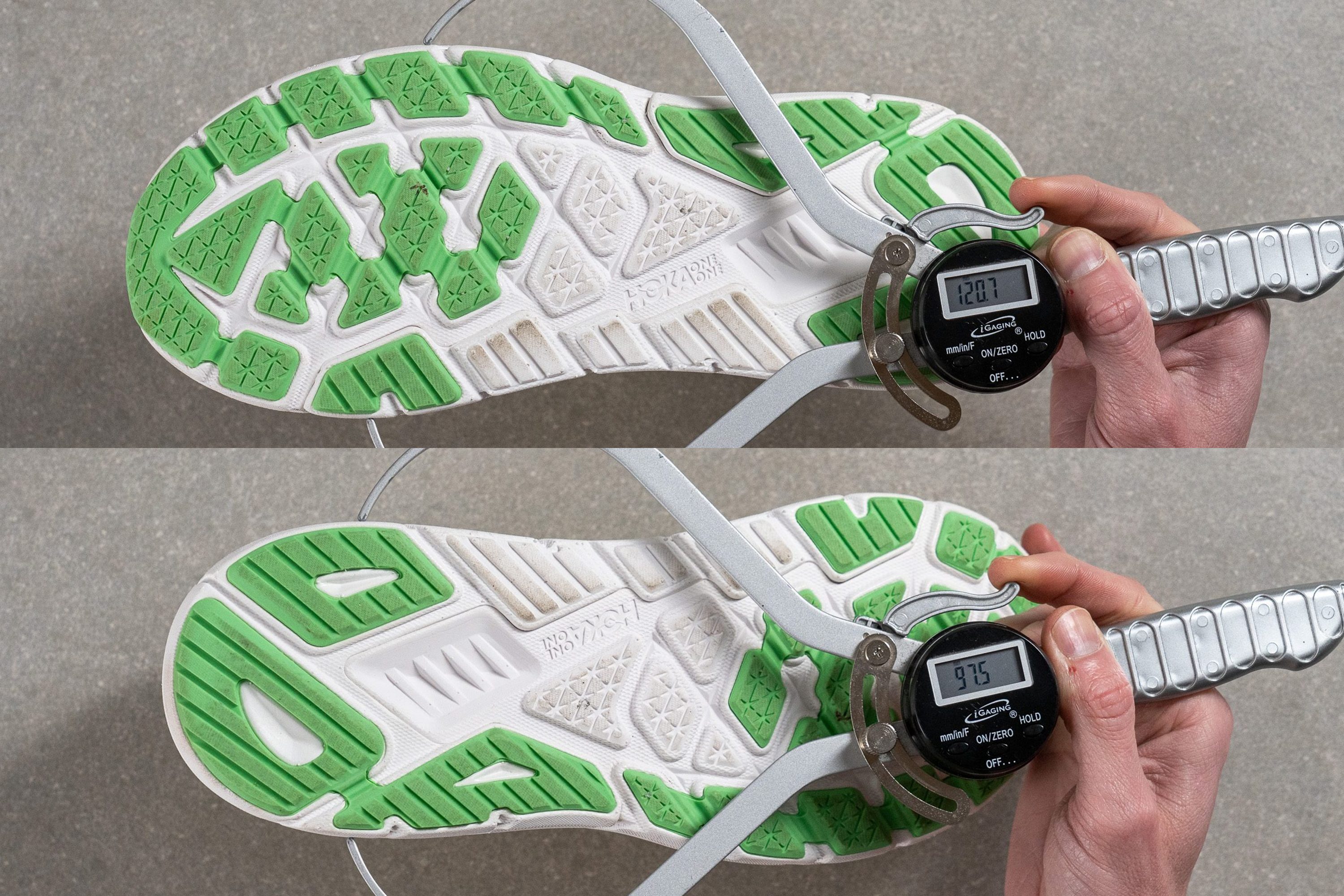
Trademark stability technologies in walking shoes for overpronation
At the forefront of shoe stability, Brooks, Hoka, and ASICS feature some of the most innovative and comfortable technologies for overpronation. Let’s take a closer look at their approaches.
Brooks GuideRails
All stability shoes from Brooks have a GTS abbreviation in their names (stands for “Go To Support”) and carry the brand’s GuideRails support.
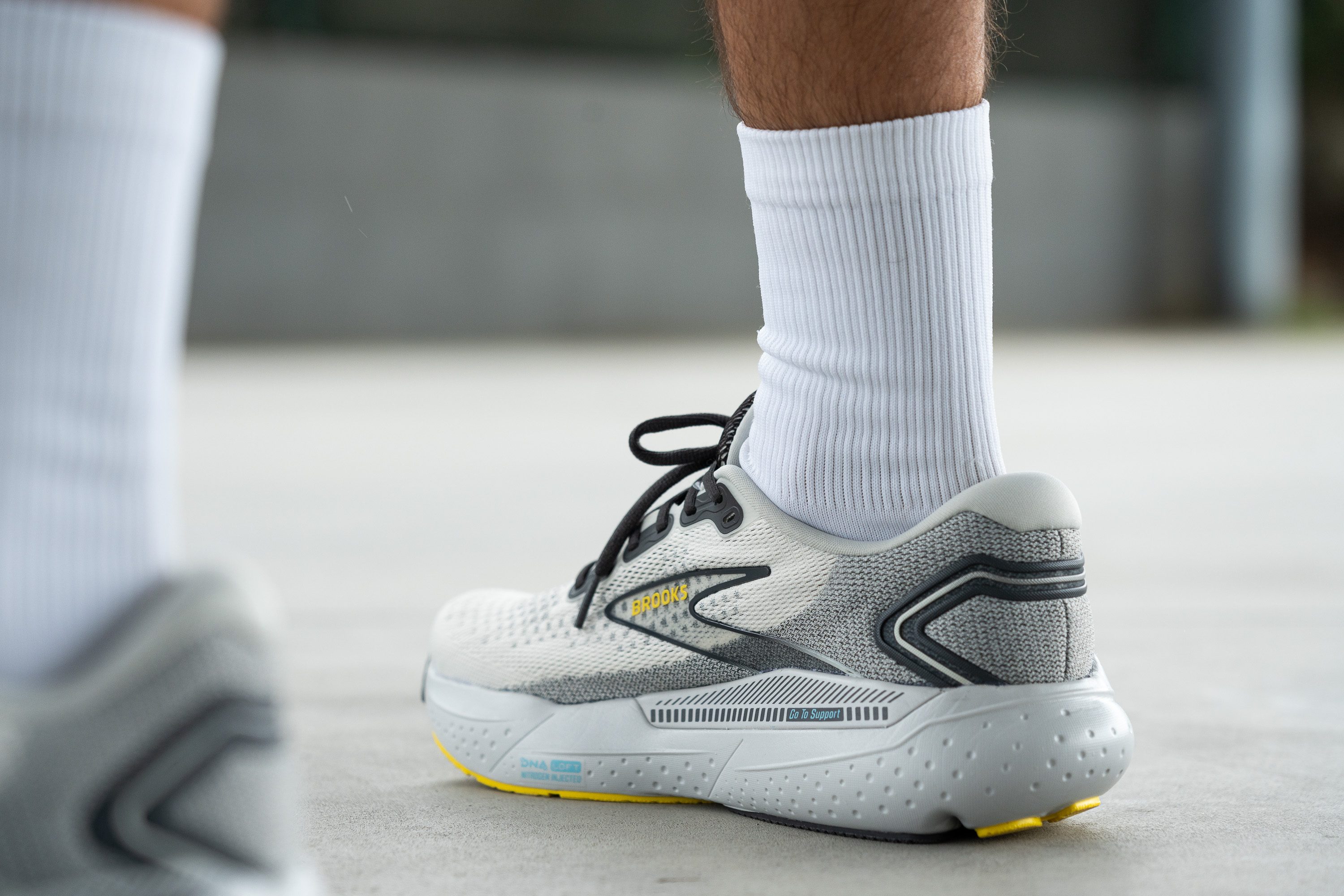
Just like train rails, GuideRails are made of two pieces of firmer foam on both sides of the heel and midfoot to keep the foot stable in its tracks.
Hoka J-Frame/H-Frame
The J-Frame is better suited for mild overpronation and is found in the brand’s Arahi series. It comprises a firmer foam segment in the shape of a letter "J" which extends along the shoe's medial side (foot arch area) and wraps around the heel.
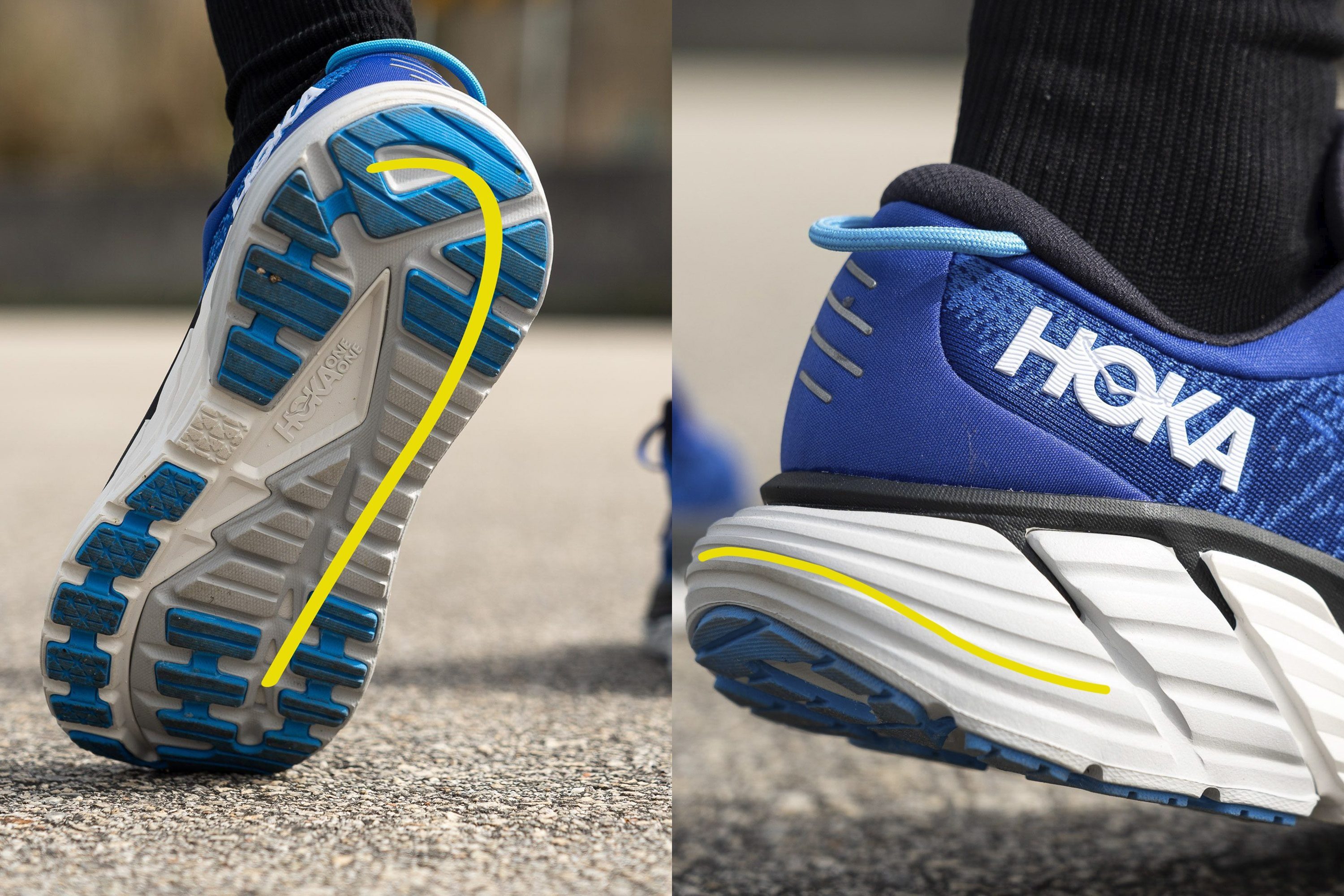
The H-Frame is a more supportive design that caters to moderate-to-severe overpronation. Unlike the J-Frame, it covers a greater area with its letter “H” shape, putting firmer foam around the entire midsole perimeter and adding a segment in the midfoot. The softer foam can be felt through the cutouts in between the “H.” This approach is used in the brand’s most supportive Gaviota shoe series.
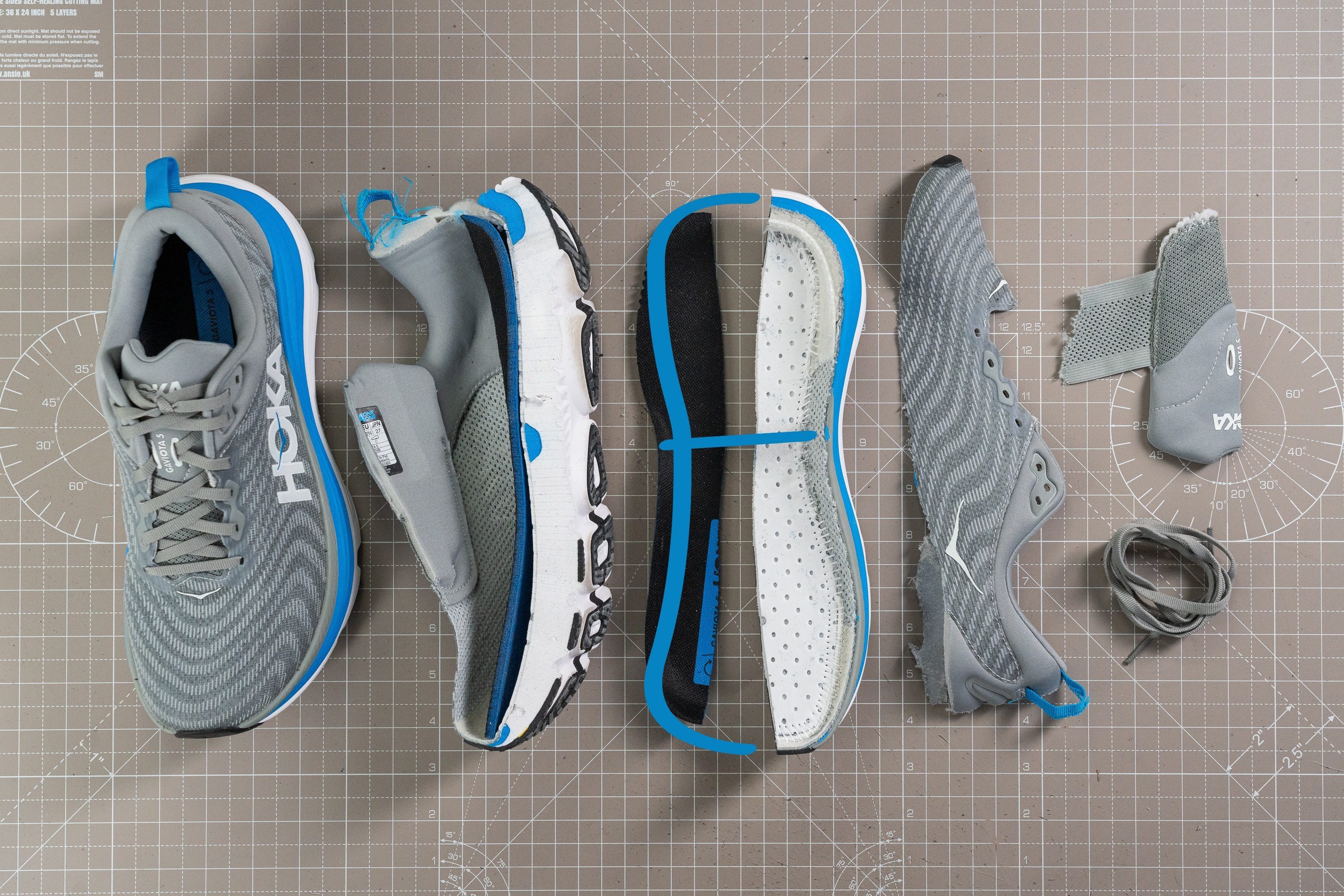
ASICS 3D/4D Support System
Similarly to Hoka’s J and H frames, ASICS offers a 3D Support System for mild-to-moderate overpronation and a 4D Support System for moderate-to-severe cases.
3D refers to three stability elements:
- Increased heel bevel
- Wider base
- Forefoot flare
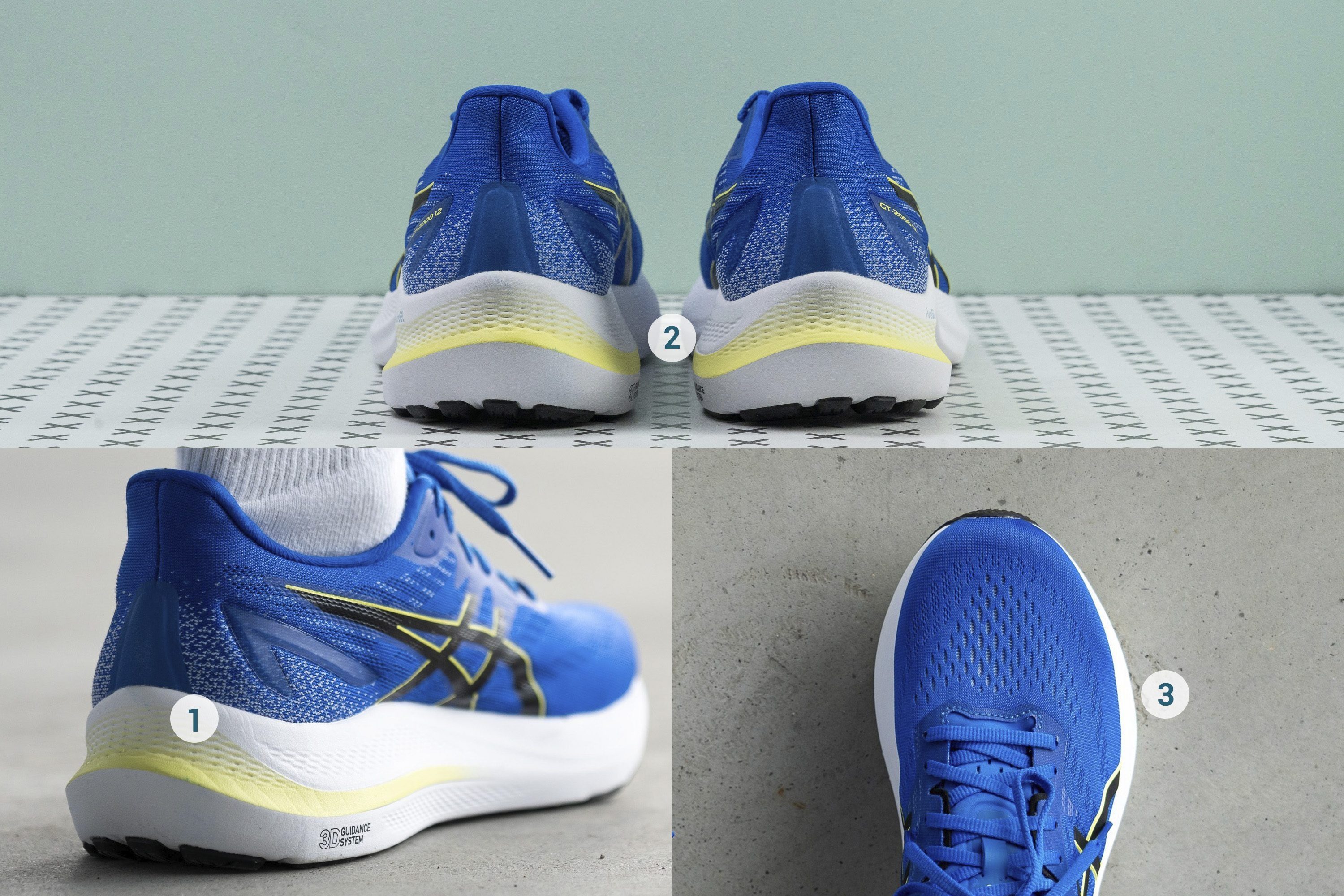
4D employs the same three components as the 3D but adds the fourth one - a medial post made of firm foam under the arch.
